
Scott and Beverly Meador are members of the North Texas Parents Club, and parents of Midn 1/c Collin Meador. Scott passed away peacefully Tuesday, Jan. 4, 2011, at home, after a courageous battle with ALS. He graduated from Texas A&M University in 1981 with a degree in animal science. He married Beverly Spencer in Corsicana on 1982. They had three sons (Spencer, Collin, and Griffin). A longtime resident of Fort Worth, he was employed by Golden Corral as operating partner/general manager for seven years. He will be remembered for his love of family, character and strong work ethic.

25 Jan 2011
The event was Friday morning, 14 Jan 2011. The gym was packed and the
students and staff loved the high energy music and worship.
At the end, the Mids came down off the risers, spread out in front
of the bleachers, and invited all who would to join them on
the floor to learn a simple dance and praise step. The students
responded with enthusiasm –
responded with hopeful curosity? –
responded with dutiful resignation? –
yes, with bust-a-move enthusiasm – after the ice was broken.
Given how energetic and spontaneous and informal Gospel
worship is, the Gospel Choir may be the best ambassadors of the
three Naval Academy singing groups.
I asked the school staff for a few of their photographs, and the person
who volunteered to help was careful to select pictures that only contained
Mids. Trust me – the gym was packed –
and rockin'. The choir
presented a plague to the Dean of Students and the Principal.
25 Jan 2011
"Many soldiers already bring their phones overseas and keep them anywhere
they can find a spot – strapped to their arms, legs, helmets and even
weapons."
Apps are being developed by the Army, and by contractors. Raytheon "has
begun building the Raytheon Advanced Tactical System, complete with 12
apps and room to add more. One of the apps lets soldiers track the
locations of their friends, while another lets them share cameras with
other soldiers to relay intelligence information."
In addition to smart phones, the Army is "deploying traveling wireless
networks that attach to road vehicles, aircraft and even air balloons
and provide connectivity in desolate regions that would otherwise be
without Internet access."
It is pursing battery-charging breakthroughs – "testing small
generators that keep phones powered for a week rather than a few hours.
Another option is plugging phones into solar backpacks. In July, the
Army deployed the first batch of Rucksack Enhanced Portable Power
Systems to Afghanistan. The 62-watt solar panel feeds off energy from
the sun or even a light bulb, and then repackages it to give the phone
a boost."
The article is available
here
Gospel Choir at Bishop Dunne High School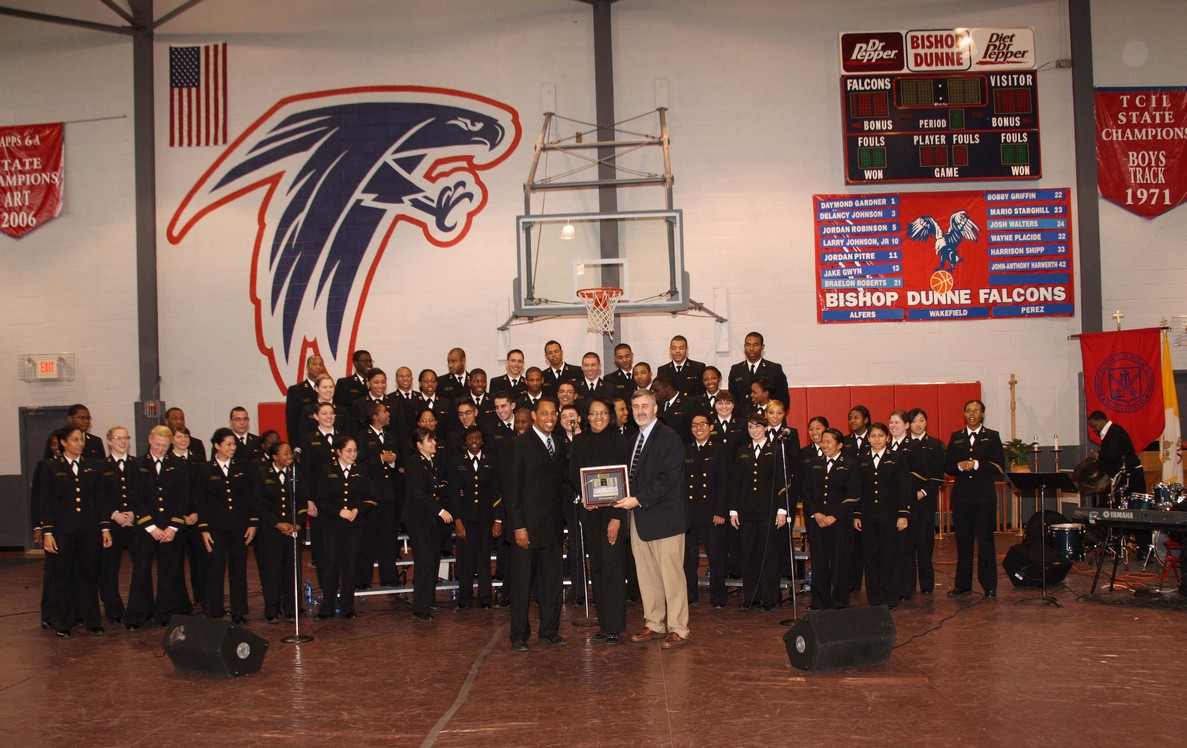
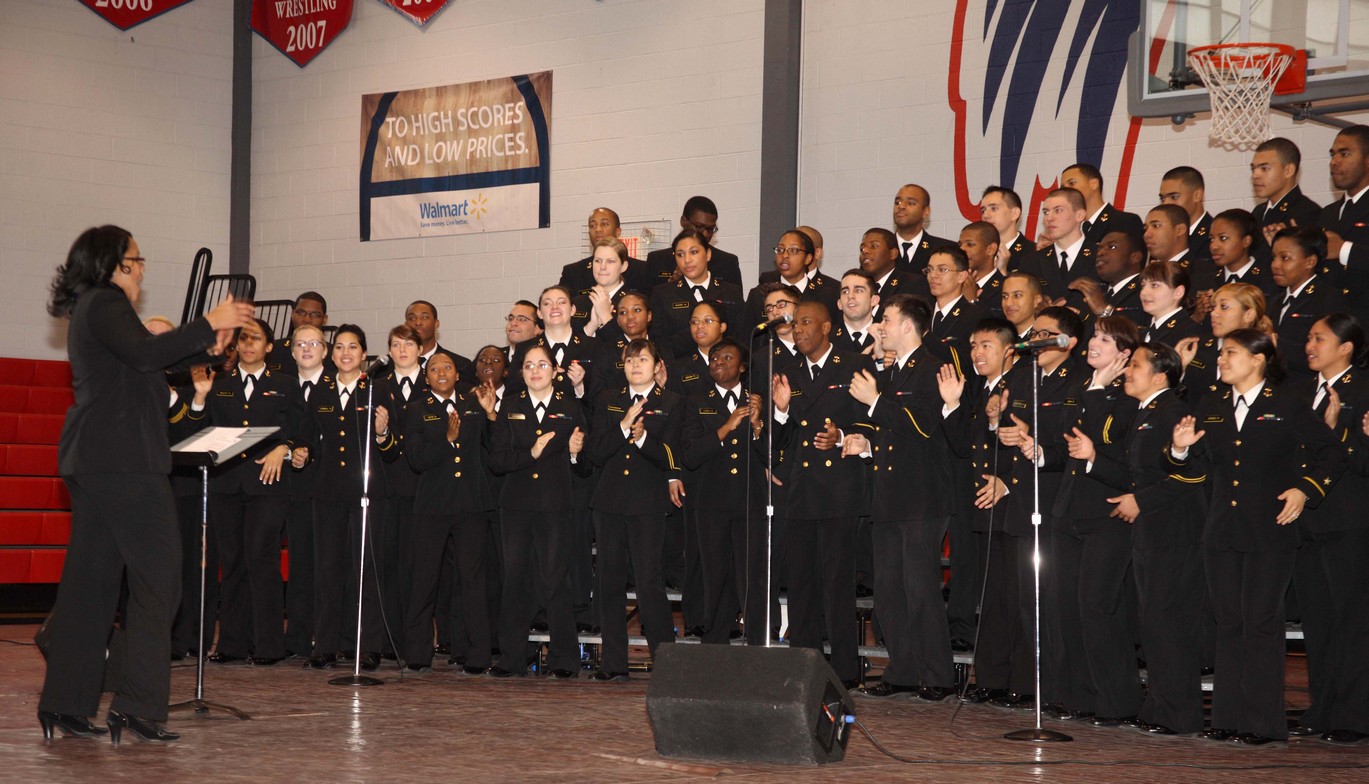
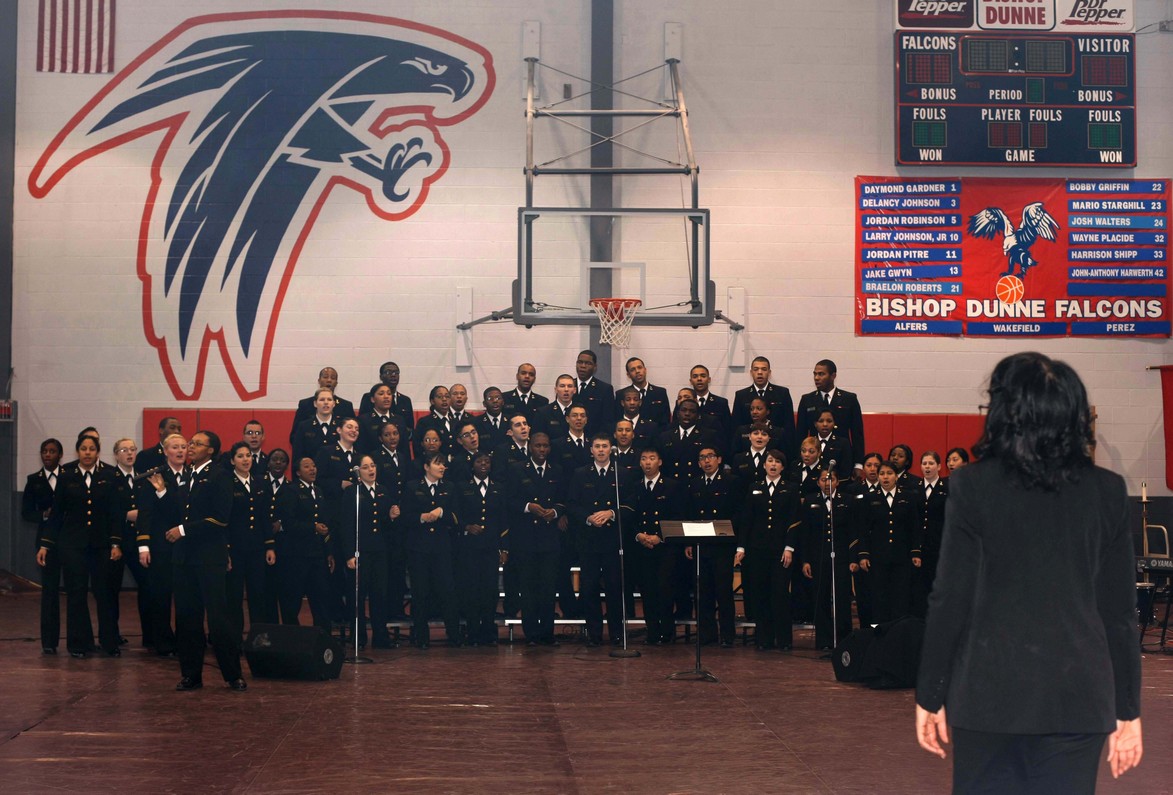

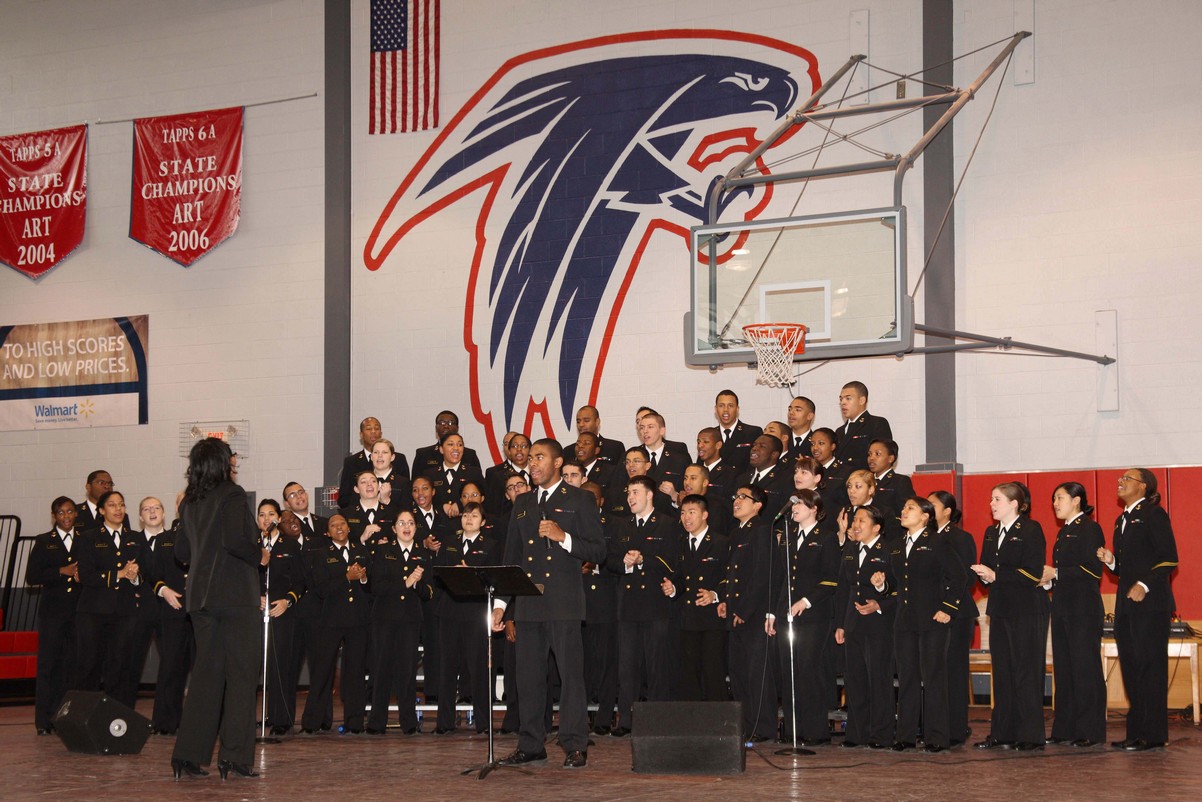
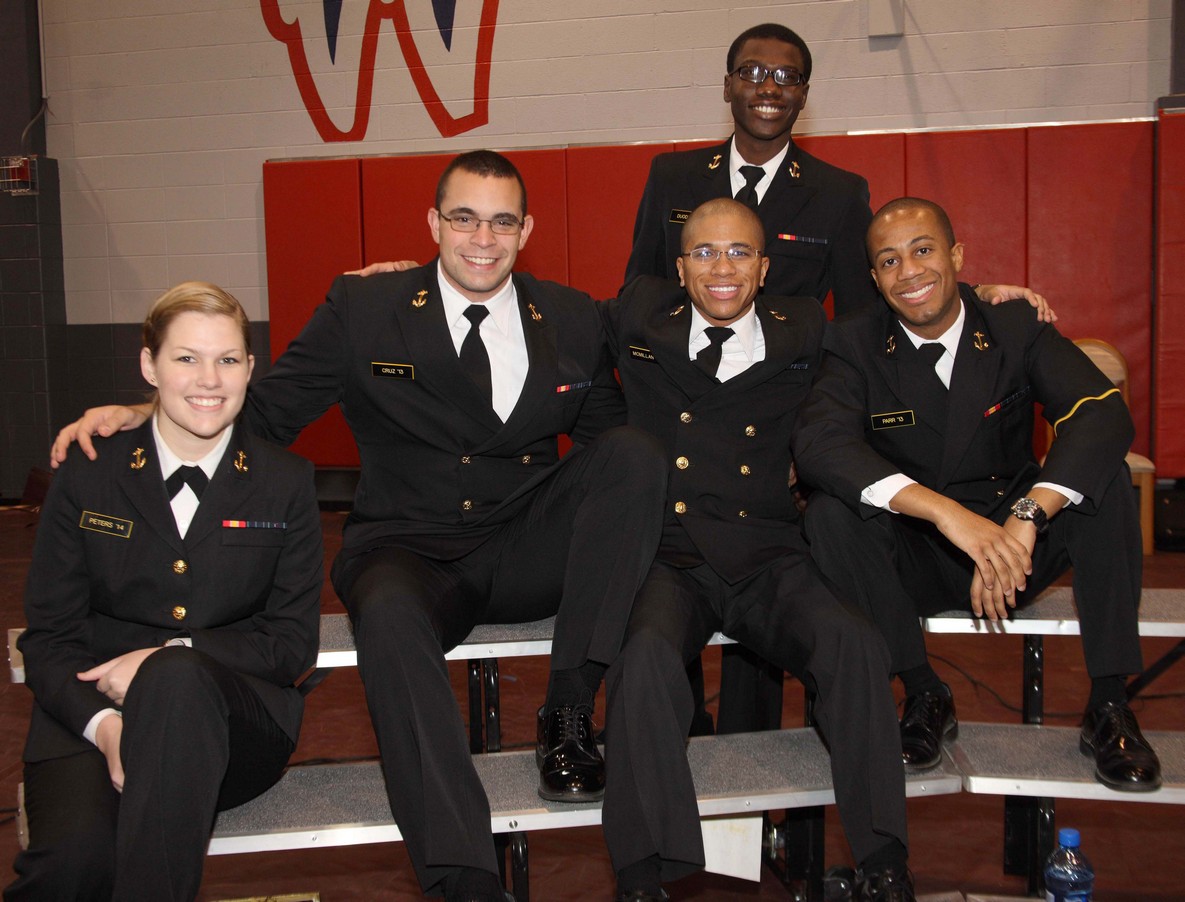
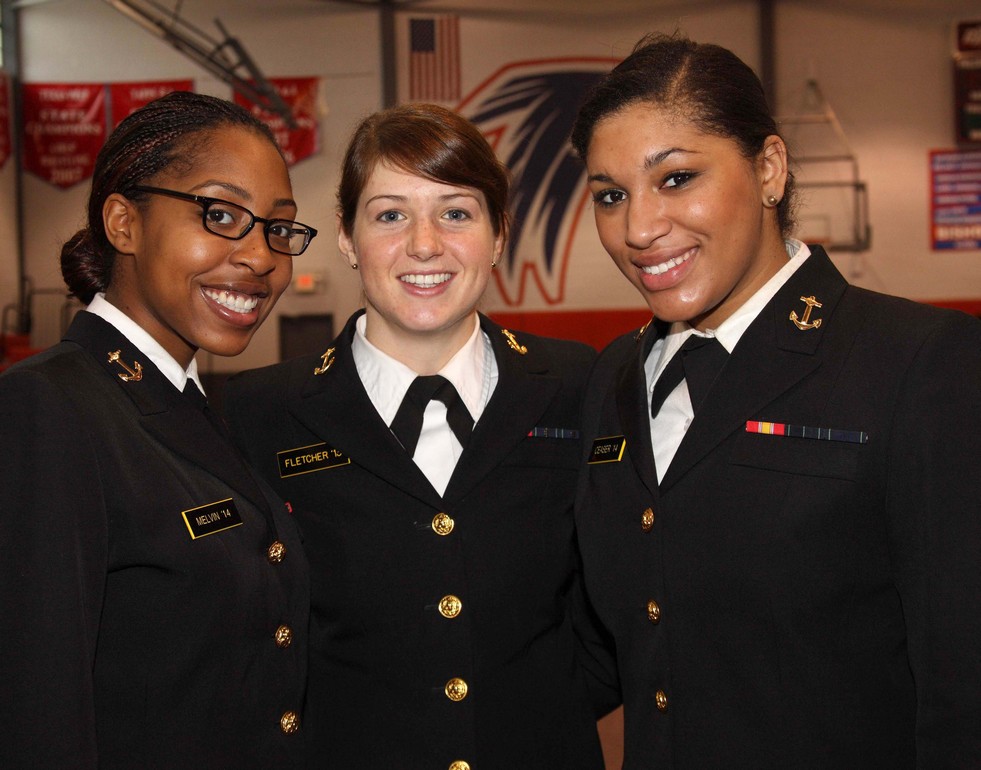
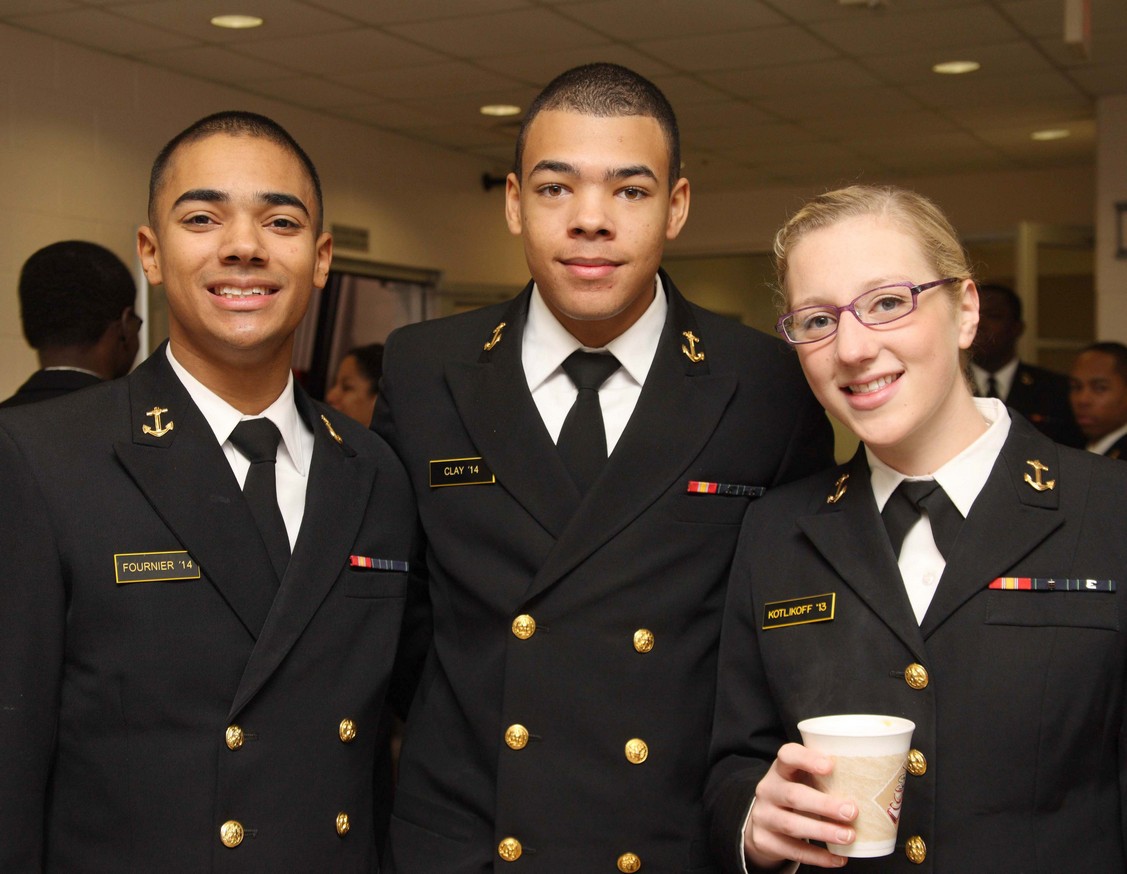
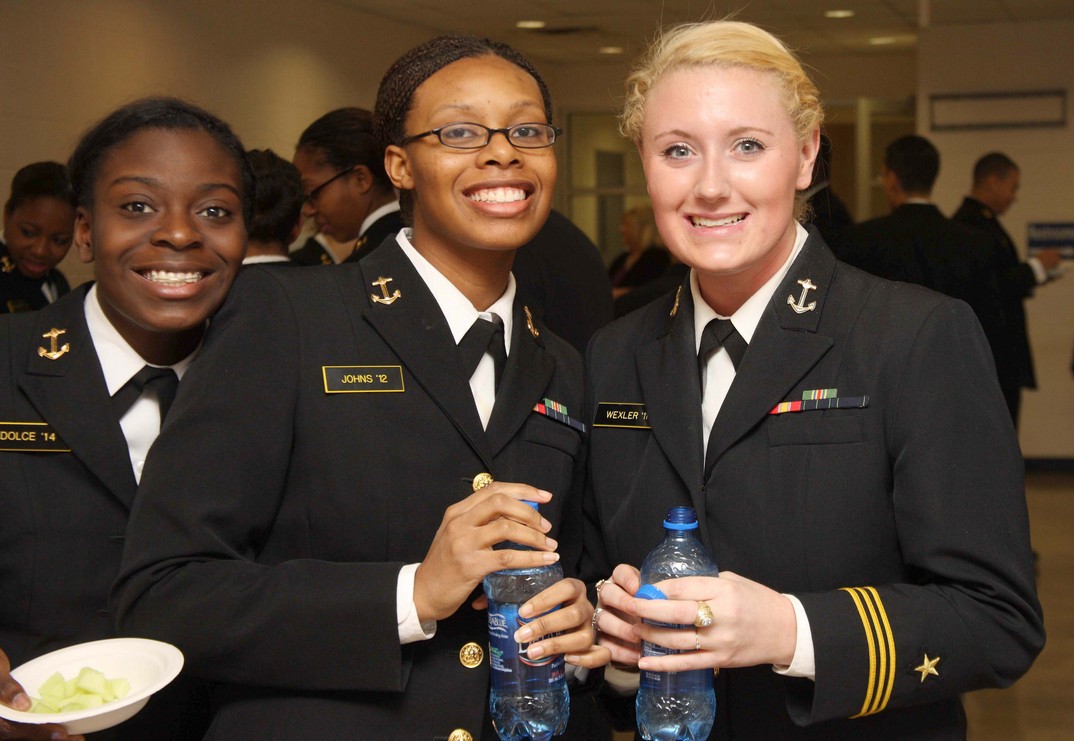

Smart phones redefine warfare In the near future, smart phones will be used to share intelligence,
translate language, control fighter jets, tanks, missiles and machine guns,
perform facial recognition to spot enemies, and identify prisoners by
capturing fingerprints.
In the near future, smart phones will be used to share intelligence,
translate language, control fighter jets, tanks, missiles and machine guns,
perform facial recognition to spot enemies, and identify prisoners by
capturing fingerprints.

|
21 Jan 2011 USNA calendars and dates |

21 Jan 2011
On 13 Nov 2010, LtGen John Kelly, USMC gave a speech to the
Semper Fi Society of St. Louis, MO. This was 4 days after his son, Lt
Robert Kelly, USMC was killed by an IED while on his 3rd combat tour.
During his speech, General Kelly spoke about the dedication and valor
of our young men and women who step forward each and every day to
protect us.
During the speech, he never mentioned the loss of his own son. He
closed the speech with the moving account of the last 6 seconds in the
lives of 2 young Marines who died with weapons blazing to protect their
brother Marines.
Two Marines, Corporal Jonathan Yale and Lance Corporal Jordan Haerter,
22 and 20 years old respectively, one from each battalion, were
assuming the watch together at the entrance gate of an outpost that
contained a makeshift barracks housing 50 Marines. The same broken down
ramshackle building was also home to 100 Iraqi police, also my men, and
our allies in the fight against the terrorists in Ramadi, a city until
recently the most dangerous city on earth and owned by Al Qaeda. Yale
was a dirt poor mixed-race kid from Virginia with a wife and daughter,
and a mother and sister who lived with him and he supported as well. He
did this on a yearly salary of less than $23,000. Haerter, on the other
hand, was a middle class white kid from Long Island . They were from
two completely different worlds.
Had they not joined the Marines they would never have met each other,
or understood that multiple Americas exist simultaneously depending on
one's race, education level, economic status, and where you might have
been born. But they were Marines, combat Marines, forged in the same
crucible of Marine training, and because of this bond they were
brothers as close, or closer, than if they were born of the same
woman.
The mission orders they received from the sergeant squad leader I am
sure went something like: "Okay you two clowns, stand this post and let
no unauthorized personnel or vehicles pass. You clear?" I am also sure
Yale and Haerter then rolled their eyes and said in unison something
like: "Yes Sergeant," with just enough attitude that made the point
without saying the words, "No kidding sweetheart, we know what we're
doing." They then relieved two other Marines on watch and took up their
post at the entry control point of Joint Security Station Nasser, in
the Sophia section of Ramadi, Al Anbar, Iraq.
A few minutes later a large blue truck turned down the alley way -
perhaps 60-70 yards in length - and sped its way through the serpentine
of concrete jersey walls. The truck stopped just short of where the two
were posted and detonated, killing them both catastrophically.
Twenty-four brick masonry houses were damaged or destroyed. A mosque
100 yards away collapsed. The truck's engine came to rest two hundred
yards away, knocking most of a house down before it stopped. Our
explosive experts reckoned the blast was made of 2,000 pounds of
explosives. Two died, and because these two young infantrymen didn't
have it in their DNA to run from danger, they saved 150 of their Iraqi
and American brothers-in-arms.
When I read the situation report about the incident a few hours after
it happened I called the regimental commander for details as something
about this struck me as different. Marines dying or being seriously
wounded is commonplace in combat. We expect Marines regardless of rank
or MOS to stand their ground and do their duty, and even die in the
process, if that is what the mission takes. But this just seemed
different. The regimental commander had just returned from the site and
he agreed, but reported that there were no American witnesses to the
event - just Iraqi police. I figured if there was any chance of finding
out what actually happened, and then to decorate the two Marines to
acknowledge their bravery, I'd have to do it, as a combat award
requires two eye-witnesses and we figured the bureaucrats back in
Washington would never buy Iraqi statements. If it had any chance at
all, it had to come under the signature of a general officer.
I traveled to Ramadi the next day and spoke individually to a
half-dozen Iraqi police, all of whom told the same story. The blue
truck turned down into the alley and immediately sped up as it made its
way through the serpentine. They all said, "We knew immediately what
was going on as soon as the two Marines began firing." The Iraqi police
then related that some of them also fired, and then to a man, ran for
safety just prior to the explosion. All survived. Many were injured,
some seriously. One of the Iraqis elaborated and with tears welling up
said, "They'd run like any normal man would to save his life." What he
didn't know until then, he said, and what he learned that very instant,
was that Marines are not normal. Choking past the emotion he said,
"Sir, in the name of God, no sane man would have stood there and done
what they did. No sane man. They saved us all."
What we didn't know at the time, and only learned a couple of days
later after I wrote a summary and submitted both Yale and Haerter for
posthumous Navy Crosses, was that one of our security cameras, damaged
initially in the blast, recorded some of the suicide attack. It
happened exactly as the Iraqis had described it. It took exactly six
seconds from when the truck entered the alley until it detonated.
You can watch the last six seconds of their young lives. Putting myself
in their heads I supposed it took about a second for the two Marines to
separately come to the same conclusion about what was going on once the
truck came into their view at the far end of the alley. Exactly no time
to talk it over, or call the sergeant to ask what they should do. Only
enough time to take half an instant and think about what the sergeant
told them to do only a few minutes before: "let no unauthorized
personnel or vehicles pass." The two Marines had about five seconds
left to live.
It took maybe another two seconds for them to present their weapons,
take aim, and open up. By this time the truck was half-way through the
barriers, and gaining speed the whole time. Here, the recording shows a
number of Iraqi police, some of whom had fired their AKs, now
scattering like the normal and rational men they were - some running
right past the Marines. They had three seconds left to live.
For about two seconds more, the recording shows the Marines' weapons
firing non-stop; the truck's windshield exploding into shards of glass
as their rounds take it apart and tore into the body of the
son-of-a-bitch who is trying to get past them to kill their brothers -
American and Iraqi - bedded down in the barracks, totally unaware of
the fact that their lives at that moment depended entirely on two
Marines standing their ground. If they had been aware, they would have
known they were safe because two Marines stood between them and
a crazed suicide bomber. The recording shows the truck careening to a
stop immediately in front of the two Marines. In all of the
instantaneous violence Yale and Haerter never hesitated. By all reports
and by the recording, they never stepped back. They never even started
to step aside. They never even shifted their weight. With their feet
spread shoulder width apart, they leaned into the danger, firing as
fast as they could work their weapons. They had only one second left to
live.
The truck explodes. The camera goes blank. Two young men go to their
God. Six seconds. Not enough time to think about their families, their
country, their flag, or about their lives or their deaths, but more
than enough time for two very brave young men to do their duty into
eternity. That is the kind of people who are on watch all over the
world tonight - for you.
We Marines believe that God gave America the greatest gift he could
bestow to man while he lived on this earth - freedom. We also believe
he gave us another gift nearly as precious - our soldiers, sailors,
airmen, Coast Guardsmen, and Marines - to safeguard that gift and
guarantee no force on this earth can ever steal it away. It has been my
distinct honor to have been with you here today. Rest assured our
America, this experiment in democracy started over two centuries ago,
will forever remain the "land of the free and home of the brave" so
long as we never run out of tough young Americans who are willing to
look beyond their own self-interest and comfortable lives, and go into
the darkest and most dangerous places on earth to hunt down and kill
those who would do us harm.
God Bless America, and SEMPER FIDELIS!
The last 6 seconds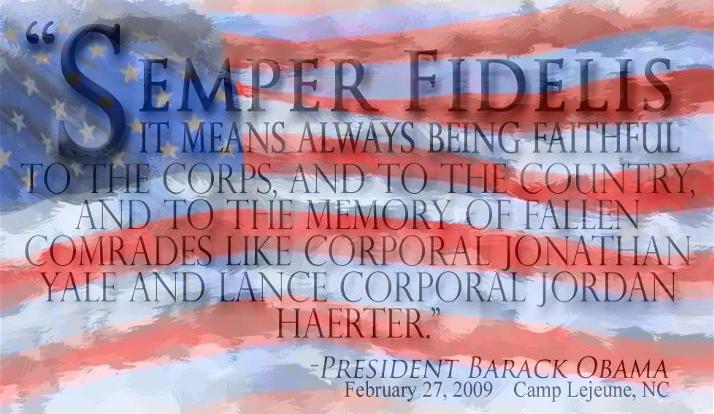
The Last 6 Seconds
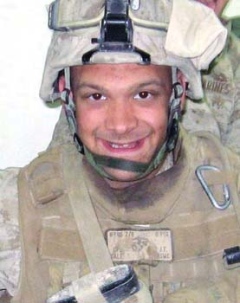
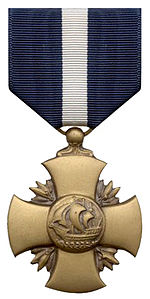
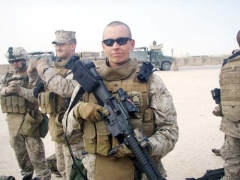
Sometimes, doing our best is not enough.
Sometimes, we must do what is required. -- Winston Churchill

|
20 Jan 2011 Knowing when to hold 'em, knowing when to fold 'em "The early bird gets the worm, but the second mouse gets the cheese." "The early worm is for the birds." "We consider too much the good luck of the early bird and not enough the bad luck of the early worm." -- Franklin Roosevelt "Eagles may soar, but weasels don't get sucked into jet engines." "It could be that the purpose of your life is only to serve as a warning to others." "When everything's coming your way, you're in the wrong lane." |
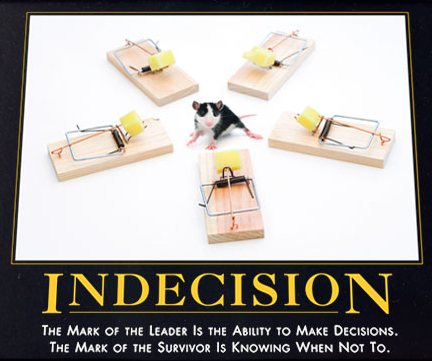
|

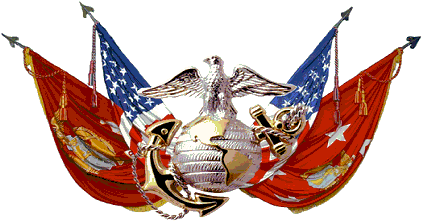
|
20 Jan 2011From: Commandant of the Marine Corps Date: 22 Oct 2010 Subj: No such thing as a former MarineA Marine is a Marine – there's no such thing as a former Marine. You're a Marine, just in a different uniform and a different phase of life. You'll always be a Marine because you [were forged in the crucible of] Parris Island, or San Diego, or the hills of Quantico. There's no such thing as a former Marine.
|

20 Jan 2011
In March of 2006, the Center for the Study of Professional Military Ethics
invited LtGen James Mattis to speak at the Naval Academy. You recognize that
name from the December Poop Deck — he was the Brigadier General
standing duty on Christmas day so that the young officer who was scheduled to
have the duty could be with his family. General Mattis' entire talk is
here Major portions will be excerpted in
several pieces. This first installment makes thought-provoking references to
the experiment that is America.
Three years ago this month, a vice admiral leaned across the
table to me, and he said, "You know what's going to happen in
Afghanistan. The enemy cannot hold Mazar-e Sharif, and they
will fall back through Kabul, and they will reinforce Kandahar.
One of these times, one of our bombs is going to go astray and hit
a hospital or something, and then we're going to have to back
off." He said, "Can you get Marines from the Pacific Fleet and
the Mediterranean fleet together, land in southern Afghanistan,
and raise hell?" I said, "Yes, I can do that," and then I walked
out, scratching my head, trying to figure out how I was going to
do it. As I walked out the door, I saw an old shipmate from
Coronado, a SEAL, the commodore of the SEALs, and I walked
up to him and said, "What are you doing in Bahrain?" He said,
"Well, I'm trying to get into the war, and right now, I've got a few
problems." So two shipmates shook hands on a hot night in
Bahrain, and we went off to fight the war together.
But what was interesting was I never received another order from
Admiral Moore other than to go into southern Afghanistan, and
that's the way it will come to you. It's not like [you will have]
three months to get ready. Now, it's for real. It's just going to
come with an admiral you have never met before who says, "I'm
going to give you six ships and 10,000 sailors and Marines. Go
do it."
But he did not have to ask me or tell me or caution me to keep
our country's honor clean. It was something that he and I
understood from our years of service. It started when we were 18
years old, and he and I had never shaken hands before in our
lives, and yet right there was an unspoken agreement between the
two of us that he had just told me to go in and slaughter as many
of the enemy as I could find. Together with our SEAL comrades
in arms, we set out to do that. Every innocent person in
Afghanistan learned they had nothing to fear from us, and what a
difference that was.
Now, we did not realize that that enemy would collapse so easily,
but you know, if you and I had some time to think about it, we
probably would have figured it out, and I'll tell you why.
Anybody [the Taliban] who spent the last five years slapping
women around for not wearing veils doesn't have a lot of
manhood left in him, you know what I mean? When you got
sailors and Marines in close to these guys who had sacrificed
their honor, who had sacrificed their manhood, when [we] got in
close, the ferocity of our sailors and Marines was more than
sufficient to kill the enemy.
I would like to come here tonight and talk in more erudite terms
about conflict and conflict resolution. Your job, my fine young
men and women, is to find the enemy that wants to end this
experiment and kill every one of them until they're so sick of the
killing that they leave us and our freedoms intact. You all
understand where I'm coming from?
[Applause.]
Ethical Challenges in Contemporary Conflict – part 1
While we are separated by many years and the rank
and the hierarchy of the military, you and I have more in
common than we have that separates us. I say this because,
whether you have 30 years in the naval service or more (like your
Admiral and I) or you have three months, what we are really
looking for, if we are to keep this great big experiment called
America alive - and that's all it is, an experiment - we need cocky,
macho, unselfish, and morally very straight young men and
women to lead our forces against the enemy.
|
15 Jan 2011 Airmen killed in '69 are laid to rest The Dallas Morning News has done a good job honoring Major Robert Tucci and Colonel James Dennany (USAF) who were killed when their F-4 Phantom was shot down over the Ho Chi Minh Trail. Only recently was their plane found in the jungles of Laos. The photo and caption to the right appeared in Thursday's paper. There are two things wrong with the caption, and a third error with the choice of a stock photo. answer A reader submitted the following comment ... I was in combat crew training with Jim Dennany in 1968. After graduation, we both ended up at Udorn Air Base Thailand We took every chance we had to fly combat missions, either dive bombing, radar offset bombing, or escort missions for the RF-4 reconnaissance aircraft into North Vietnam. The escort missions meant we got "hosed down" by a lot of anti-aircraft rounds every mission, but we survived the missions North. In the last month before Jim was to rotate home, he and Robert were scheduled to fly an escort mission for an AC-130 Gunship over a particularly dangerous area where we had lost a number of aircraft. To protect the Gunship, they attacked areas of heavy ground fire; unfortunately, their F-4 sustained serious damage and crashed. Other aircrews described it as "a big ball of fire" on impact, so there was little chance for a crew to survive. These two brave young men gave their all to protect a number of crew members on the AC-130 gunship, allowing them to complete their mission and survive. In my eyes, they are both heroes and deserve the highest recognition for their sacrifice. |
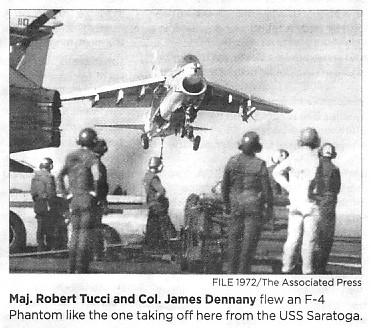
|

15 Jan 2011
A wonderful "lessons learned" submission to Military Officer
magazine. The original article is
here
The captain, a Navy Cross recipient from World War II, took a drag of his
cigar and said, "Ken, the book is what you use when you don't know what else
to do. I've seen those two up on the bridge, and I'll bet they are scared as
hell. I don't want them to think they had one chance in the Navy and they
blew it. But I will do whatever you recommend. It's your call."
He was giving me a great leadership lesson – if I was capable of
grasping it.
At captain's mast, it was clear the two sailors were frightened. The captain
read the charges: "Sleeping on watch is a damned serious offense in my Navy.
But Lieutenant Junior Grade Breaux here thinks you two are worth saving. If
it was my call, I'd throw the book at you, but I have to go with his
recommendation."
My recommendation was for 10 days extra duty, confinement to the ship,
and a suspended reduction in rank.
As we left the area, my two sailors thanked me profusely: "Sir, we will
never let that happen again. Thanks for your confidence in us."
I smiled to myself. The captain made himself the bad guy and me the hero.
The book is what you use when you don't know what else to do
My first challenge as a U.S. Navy division officer was to recommend punishment
for two sailors who had fallen asleep on watch. The two sailors
had never been a problem before, they always had good attitudes, and seemed
eager to pursue their duties. Several days before captain's mast, my captain asked for my recommendation.
My response was, "We should throw the book at them, sir."
Several days before captain's mast, my captain asked for my recommendation.
My response was, "We should throw the book at them, sir."
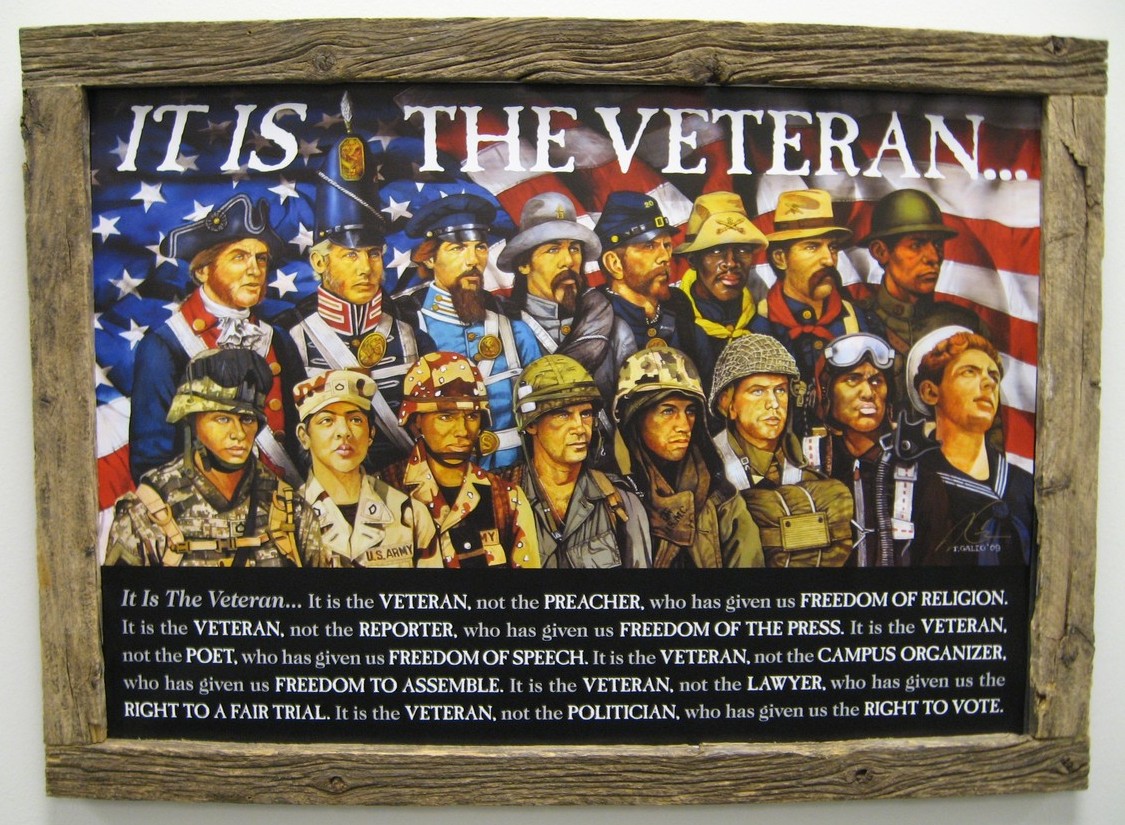 |
It is the Soldier, not the minister, who has given us freedom of religion. It is the Soldier, not the reporter, who has given us freedom of the press. It is the Soldier, not the poet, who has given us freedom of speech. It is the Soldier, not the campus organizer, who has given us freedom to protest. It is the Soldier, not the lawyer, who has given us the right to a fair trial. It is the Soldier, not the politician, who has given us the right to vote. It is the Soldier who salutes the flag, who serves beneath the flag, and whose coffin is draped by the flag, who allows the protester to burn the flag. -- Charles Province, U.S. Army veteran, © 1970 © 2005 |

11 Jan 2011
The following account is the second half of, "One Marine, One Ship"
by Vin Suprynowicz that appeared on 22 Oct 2000
link
It is a remarkable tutorial on all the degrees of freedom/responsibility
that must be juggled on the "open sea".
So desperate did things become that finally
Admiral Bull Halsey himself broke a stern War College edict -- the one
against committing capital ships in restricted waters. Gambling the future
of the cut-off troops on Guadalcanal on one final roll of the dice, Halsey
dispatched into the Slot his two remaining fast battleships, the USS South
Dakota and the USS Washington, escorted by the only four destroyers with
enough fuel in their bunkers to get them there and back.
In command of the 28-knot battlewagons was the right man at the right
place, gunnery expert Rear Admiral Willis A. "Ching Chong China" Lee. Lee's
flag flew aboard the Washington, in turn commanded by Captain Glenn Davis.
Lee was a nut for gunnery drills. "He tested every gunnery-book rule with
exercises," Naval historian David Lippman writes, "and ordered gunnery drills
under odd conditions -- turret firing with relief crews, anything that might
simulate the freakishness of battle."
As it turned out, the American destroyers need not have worried about
carrying enough fuel to get home. By 11 p.m. on Nov. 13, outnumbered better
than three-to-one by a massive Japanese task force driving down from the
northwest, every one of the four American destroyers had been shot up, sunk,
or set aflame, while the South Dakota -- known throughout the fleet as a
jinx ship -- managed to damage some lesser Japanese vessels but continued to
be plagued with electrical and fire control problems.
"Washington was now the only intact ship left in the force," Lippman
writes. "In fact, at that moment Washington was the entire U.S. Pacific
Fleet. She was the only barrier between (Admiral) Kondo's ships and
Guadalcanal. If this one ship did not stop 14 Japanese ships right then and
there, America might lose the war."
"On Washington's bridge, Lieutenant Ray Hunter still had the conn. He had
just heard that South Dakota had gone off the air and had seen (destroyers)
Walke and Preston "blow sky high." Dead ahead lay their burning wreckage,
while hundreds of men were swimming in the water and Japanese ships were
racing in.
"Hunter had to do something. The course he took now could decide the war.
'Come left,' he said, and Washington straightened out on a course parallel
to the one on which she (had been) steaming. Washington's rudder change put
the burning destroyers between her and the enemy, preventing her from being
silhouetted by their fires.
"The move made the Japanese momentarily cease fire. Lacking radar, they
could not spot Washington behind the fires."
"Meanwhile, Washington raced through burning seas. Everyone could see dozens
of men in the water clinging to floating wreckage. Flag Lieutenant Raymond
Thompson said, 'Seeing that burning, sinking ship as it passed so close
aboard, and realizing that there was nothing I, or anyone, could do about
it, was a devastating experience.'"
"Commander Ayrault, the Washington's executive officer, clambered down
ladders, ran to Bart Stoodley's damage-control post, and ordered Stoodley to
cut loose life rafts. That saved a lot of lives. But the men in the water
had some fight left in them. One was heard to scream, 'Get after them,
Washington!'"
Sacrificing their ships by maneuvering into the path of torpedoes intended
for the Washington, the captains of the American destroyers had given China
Lee one final chance. The Washington was fast, undamaged, and bristling
with 16-inch guns. And, thanks to Lt. Hunter's course change, she was also
now invisible to the enemy.
Blinded by the smoke and flames, the Japanese battleship Kirishima turned on
her searchlights, illuminating the helpless South Dakota, and opened fire.
Finally, as her own muzzle blasts illuminated her in the darkness, Lee and
Davis could positively identify an enemy target.
The Washington's main batteries opened fire at 12 midnight precisely. Her
new SG radar fire control system worked perfectly. Between midnight and 1207
a.m., Nov. 14, the "last ship in the U.S. Pacific Fleet" stunned the
battleship Kirishima with 75, 16-inch shells. For those aboard the
Kirishima, it rained steel.
In seven minutes, the Japanese battleship was reduced to a funeral pyre.
She went down at 0325 a.m., the first enemy sunk by an American battleship
since the Spanish-American War. Stunned, the remaining Japanese ships
withdrew. Within days, Yamamoto and his staff reviewed their mounting
losses and recommended the unthinkable to the emperor -- withdrawal from
Guadalcanal.
"The Slot" at Guadalcanal
The Marines had won their battle on the island of Guadalcanal. But it
would be meaningless unless the U.S. Navy could figure out a way to
stop losing night battles in "The Slot" to the northwest of the island,
through which the Japanese kept sending in barges filled with supplies
and reinforcements for their own desperate forces on Guadalcanal.
The U.S. Navy had lost so many ships in those dreaded night actions that
the waters off Savo were given the grisly sailor's nickname by which they're
still known today: Ironbottom Sound.
|
10 Jan 2011 Walls are for weanies
If it doesn't get you where you want to be ... ... You're just not using enough.
When faced with a Gordian Knot – |
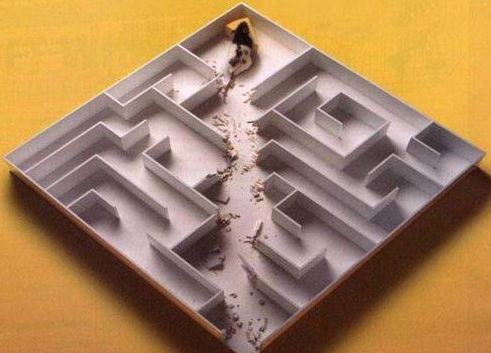
|

10 Jan 2011
P.J. O'Rourke writes about his visit to the USS Theodore Roosevelt (CVN-71).
The complete article is here
Carrier landings are more astonishing. We were in heavy seas. Spray was
coming over the bow onto the flight deck, 60 feet above the waterline.
As the ship was pitching, 18 tons of F-18 with a wingspan of 40-odd
feet approached at the speed of celebrity sex rumor. Four acres of
flight deck has never looked so small. Had it been lawn you'd swear you
could do it in 15 minutes with a push mower."
"... The ship is immense, going seven decks down from the flight deck
and ten levels up in the tower. But it's full, with some 5,500 people
aboard. Living space is as cramped as steerage on the way to Ellis
Island. Even the pilots live in three-bunk cabins as small and
windowless as hall closets. A warship is a sort of giant Sherman tank
upon the water. Once below deck you're sealed inside. There are no
cheery portholes to wave from."
"... The crew is in more danger than the pilots. If an arresting cable
breaks – and they do – half a dozen young men and women could be sliced
in half. When a plane crashes, a weapon malfunctions, or a fire breaks
out, there's no ejection seat for the flight deck crew. While we were
on the Theodore Roosevelt a memorial service was held for a crew member
who had been swept overboard. Would there have been an admiral and a
captain of an aircraft carrier and hundreds of the bravest Americans at
a memorial service for you when you were 20?"
"... Back on the COD you're buckled in and told to brace as if for a
crash. Whereupon there is a crash. The catapult sends you squashed
against your flight harness. And just when you think that everything
inside your body is going to blow out your nose and navel, it's over.
You're in steady, level flight."
24 hours on the "Big Stick"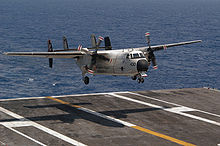 "... you travel out to the carrier on a powerful, compact, and chunky
aircraft – a weight-lifter version of a regional airline
turboprop. This is a C-2 Greyhound, named after the wrong dog. C-2
Flying Pit Bull is more like it. In fact what everyone calls the C-2 is
the 'COD.' This is an acronym for 'Curling the hair Of Dumb reporters,'
although they tell you it stands for 'Carrier Onboard Delivery.'
There is only one window in the freight/passenger compartment, and
you're nowhere near it. Your seat faces aft. Cabin lighting and noise
insulation are absent. The heater is from the parts bin at the Plymouth
factory in 1950. You sit reversed in cold, dark cacophony while the
airplane maneuvers for what euphemistically is called a 'landing.' The
nearest land is 150 miles away. And the plane doesn't land; its
tailhook snags a cable on the carrier deck. The effect is of being
strapped to an armchair and dropped backwards off a balcony onto a
patio. There is a fleeting moment of unconsciousness. This is a good
thing, as is being far from the window, because what happens next is
that the COD reels the hooked cable out the entire length of the
carrier deck until a big, fat nothing is between you and a plunge in
the ocean, should the hook, cable, or pilot's judgment snap. Then,
miraculously, you're still alive."
"... you travel out to the carrier on a powerful, compact, and chunky
aircraft – a weight-lifter version of a regional airline
turboprop. This is a C-2 Greyhound, named after the wrong dog. C-2
Flying Pit Bull is more like it. In fact what everyone calls the C-2 is
the 'COD.' This is an acronym for 'Curling the hair Of Dumb reporters,'
although they tell you it stands for 'Carrier Onboard Delivery.'
There is only one window in the freight/passenger compartment, and
you're nowhere near it. Your seat faces aft. Cabin lighting and noise
insulation are absent. The heater is from the parts bin at the Plymouth
factory in 1950. You sit reversed in cold, dark cacophony while the
airplane maneuvers for what euphemistically is called a 'landing.' The
nearest land is 150 miles away. And the plane doesn't land; its
tailhook snags a cable on the carrier deck. The effect is of being
strapped to an armchair and dropped backwards off a balcony onto a
patio. There is a fleeting moment of unconsciousness. This is a good
thing, as is being far from the window, because what happens next is
that the COD reels the hooked cable out the entire length of the
carrier deck until a big, fat nothing is between you and a plunge in
the ocean, should the hook, cable, or pilot's judgment snap. Then,
miraculously, you're still alive."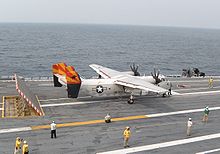 "... Carrier launches are astonishing events. The plane is moved to
within what seems like a bowling alley's length of the bow. A blast
shield larger than any government building driveway Khomeini-flipper
rises behind the fighter jet, and the jet's twin engines are cranked to
maximum thrust. A slot-car slot runs down the middle of the bowling
alley. The powered-up jet is held at the end of its slot by a steel
shear pin smaller than a V-8 can. When the shear pin shears the jet is
unleashed and so is a steam catapult that hurls the plane down the
slot, from 0 to 130 miles per hour in two seconds. And – if all goes
well – the airplane is airborne. This is not a pilot taking off. This is
a pilot as cat's eye marble pinched between boundless thumb and
infinite forefinger of Heaven's own Wham-O slingshot.
"... Carrier launches are astonishing events. The plane is moved to
within what seems like a bowling alley's length of the bow. A blast
shield larger than any government building driveway Khomeini-flipper
rises behind the fighter jet, and the jet's twin engines are cranked to
maximum thrust. A slot-car slot runs down the middle of the bowling
alley. The powered-up jet is held at the end of its slot by a steel
shear pin smaller than a V-8 can. When the shear pin shears the jet is
unleashed and so is a steam catapult that hurls the plane down the
slot, from 0 to 130 miles per hour in two seconds. And – if all goes
well – the airplane is airborne. This is not a pilot taking off. This is
a pilot as cat's eye marble pinched between boundless thumb and
infinite forefinger of Heaven's own Wham-O slingshot.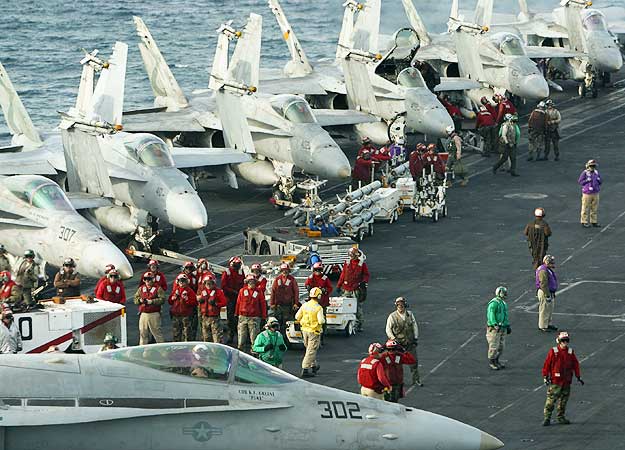 "... Scores of people are all over the flight deck during takeoffs and
landings. They wear color-coded T-shirts – yellow for flight-directing,
purple for fueling, blue for chocking and tying-down, red for
weapon-loading, brown for I-know-not-what, and so on. These people
can't hear each other. They use hand signals. And, come night ops, they
can't do that. Really, they communicate by 'training telepathy.' They
have absorbed their responsibilities to the point that each knows
exactly where to be and when and doing what.
These are supremely dangerous jobs. And most of the flight deck crew
members are only 19 or 20. Indeed the whole ship is run by youngsters.
The average age, officers and all, is about 24."
"... Scores of people are all over the flight deck during takeoffs and
landings. They wear color-coded T-shirts – yellow for flight-directing,
purple for fueling, blue for chocking and tying-down, red for
weapon-loading, brown for I-know-not-what, and so on. These people
can't hear each other. They use hand signals. And, come night ops, they
can't do that. Really, they communicate by 'training telepathy.' They
have absorbed their responsibilities to the point that each knows
exactly where to be and when and doing what.
These are supremely dangerous jobs. And most of the flight deck crew
members are only 19 or 20. Indeed the whole ship is run by youngsters.
The average age, officers and all, is about 24."
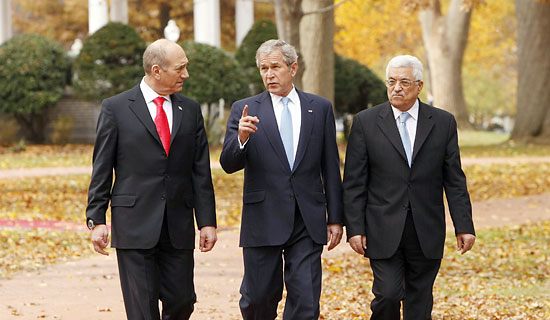 10 Jan 2011
10 Jan 2011Annapolis Conference Do you remember the Middle East peace conference held on 27 November 2007 at the Naval Academy? U.S. Secretary of State Condoleezza Rice organized and hosted the conference. Israeli Prime Minister Ehud Olmert, U.S. President George W. Bush, Palestinian President Mahmoud Abbas, and 30+ nations and groups attended. |
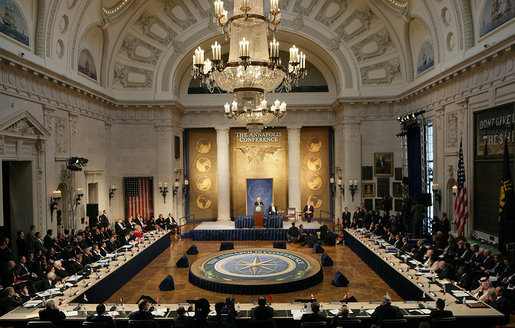
A nice summary is here |

10 Jan 2011
Andrew Roberts wrote in National Review that: Afghanistan as "the graveyard
of empires", should instead be understood as "the revolving door of empires".
[link]
"For 2500 years [Afghanistan] was always a part of somebody's empire:"
Persians, Mongols, Moghuls, Russians, British, or Soviets. "The idea of sturdy
Afghan independence is a myth." Even the more recent British experience is
largely misunderstood. The First Afghan War (1842) is remembered for the
horrific Retreat from Kabul where 16,500 people died in the dead of winter.
But Kabul was recaptured 7 months later; and "Afghanistan stayed quiet for 30
years."
The Second Afghan War (1880) was won by the British. "Afghan resistance was
subdued and Afghanistan was reduced to the status virtually of a British
protectorate until it was given its independence in 1919."
"Today, NATO is simply trying to help the majority – as we discover from
recent polling, the large majority – of Afghans 'to prevent a cancer from
once again spreading through that country,' in the words of President Obama.
Nor is Islamic fundamentalism a historically deep-seated phenomenon in
Afghanistan. NATO is often accused by the Left of trying to impose Western
values on the Afghans, but it was King Amanullah who instituted Kemalist (Kemal
Ataturk of Turkey) modernization – such as monogamy, Western clothing,
and the abolition of the veil – back in 1928. The only people seeking to
impose a foreign culture on Afghans are the Taliban.
LREC – Afghanistan
|
10 Jan 2011 For the second mouse, getting the cheese is easy Discovery is seeing what everybody else has seen, and thinking what nobody else has thought. — Albert Szent-Gyorgi Don't be afraid to take a big step when one is indicated. You can't cross a chasm in two small jumps. — David Lloyd George Every noble work is at first impossible. — Thomas Carlyle |

|
